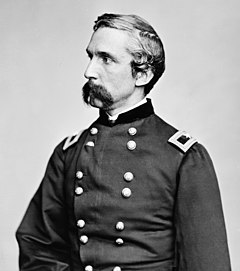 Back in Monterey, Professor Teti liked talking about focal points in history - where the actions of one man altered the course of history. His favorite example was Joshua Lawrence Chamberlain with the 20th Maine on Little Round Top at Gettysburg. Out of ammunition and with the Confederate troops making another attempt to take the hill, Chamberlain ordered his men to fix bayonets and charge down the hill. If he hadn't, the Confederates would have turned the Union flank and the Battle of Gettysburg and the entire Civil War would have turned out differently.
Back in Monterey, Professor Teti liked talking about focal points in history - where the actions of one man altered the course of history. His favorite example was Joshua Lawrence Chamberlain with the 20th Maine on Little Round Top at Gettysburg. Out of ammunition and with the Confederate troops making another attempt to take the hill, Chamberlain ordered his men to fix bayonets and charge down the hill. If he hadn't, the Confederates would have turned the Union flank and the Battle of Gettysburg and the entire Civil War would have turned out differently. What made me think of it was reading this excellent post on the Battle of Guadalcanal. One Marine held the ridge. One ship got the Japanese fleet to retreat. What a great story in U.S. history.
What made me think of it was reading this excellent post on the Battle of Guadalcanal. One Marine held the ridge. One ship got the Japanese fleet to retreat. What a great story in U.S. history.My second boat, USS HELENA, was named after a cruiser that was sunk in the Battle of the Kula Gulf in the Solomon Islands. Almost exactly 60 years after the battle, we were steaming through the Solomon Islands toward an exercise with the Australians and a port call in Brisbane, Australia. We wanted to conduct an innocent passage transit through the Solomon Islands and lay a wreath in the Kula Gulf in remembrance of the cruiser HELENA. CTF-74 (commander of submarines in the Western Pacific) initially approved our request, but then the lawyers said no. I never understood that. I don't think anyone could argue our holding a memorial service at sea could in any way be "prejudicial to the peace, good order, or security" of the Solomon Islands. If the previous HELENA hadn't been there in 1943, the people of the Solomon Islands would all be speaking Japanese, so why would they have any objection to our remembering the sacrifice of those who went there before us? We still surfaced and held a memorial service on the bridge and laid the wreath - even though we were like 50 miles out to sea from the actual site of the battle.
 We had a great little book in our wardroom that told the tale of the Battle of the Kula Gulf. It's interesting to read about the difference in command and control back then, before satellite communications or Link 11 or OTCIXS or AIS. Those ships went into battle in the pitch black of night, and they weren't really sure what toll the battle had taken until it was all over and they did roll call. The radioman on the flagship called out for a response and damage report from each of the ships in the task force. "USS SAINT LOUIS" Roger. "USS NICHOLAS" Roger. "USS HELENA..." Silence. "USS HELENA..." Silence. "USS HELENA...?" Silence. It wasn't until the roll call after the battle was over that they discovered the HELENA had been sunk, and then went in to rescue the survivors.
We had a great little book in our wardroom that told the tale of the Battle of the Kula Gulf. It's interesting to read about the difference in command and control back then, before satellite communications or Link 11 or OTCIXS or AIS. Those ships went into battle in the pitch black of night, and they weren't really sure what toll the battle had taken until it was all over and they did roll call. The radioman on the flagship called out for a response and damage report from each of the ships in the task force. "USS SAINT LOUIS" Roger. "USS NICHOLAS" Roger. "USS HELENA..." Silence. "USS HELENA..." Silence. "USS HELENA...?" Silence. It wasn't until the roll call after the battle was over that they discovered the HELENA had been sunk, and then went in to rescue the survivors.













1 comment:
WoW, Blunoz.
Love the history, the science.
Great!
Thanks a lot.
Love,
Dad
Post a Comment